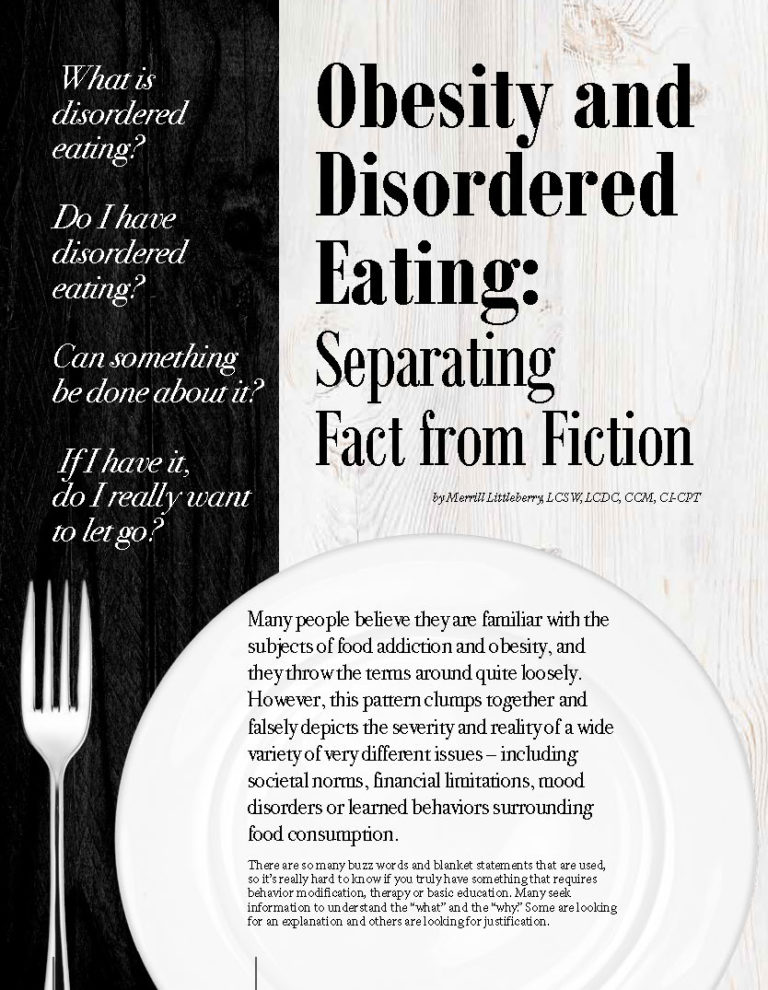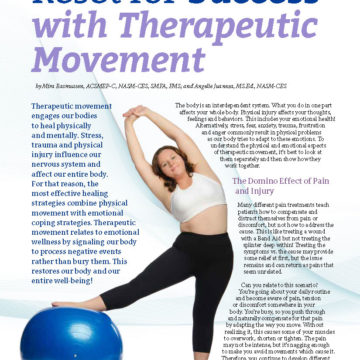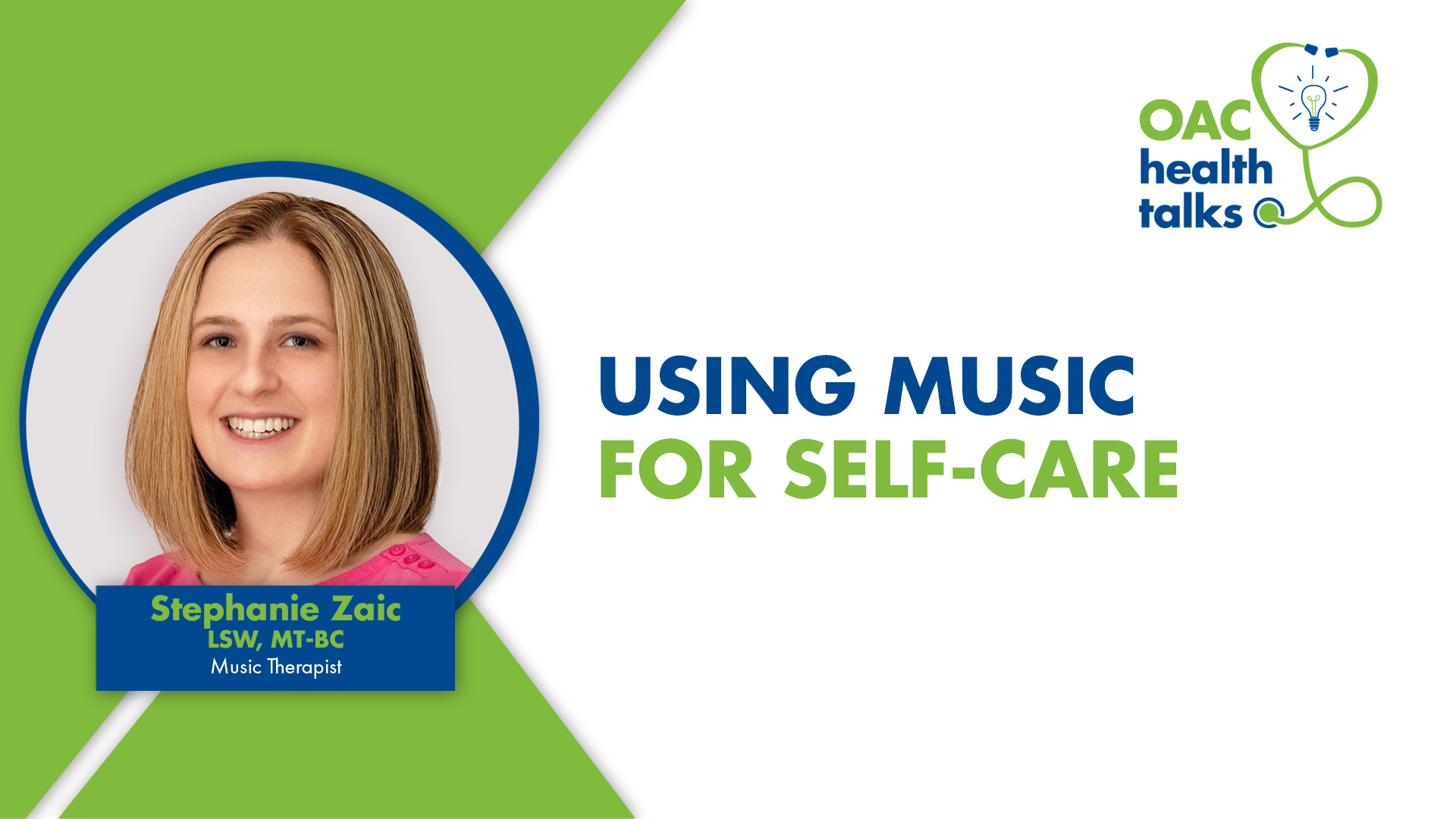Obesity and Disordered Eating: Separating Fact from Fiction


by Merrill Littleberry, LCSW, LCDC, CCM, CI-CPT
Summer 2018
Many people believe they are familiar with the subjects of food addiction and obesity, and they throw the terms around quite loosely. However, this pattern clumps together and falsely depicts the severity and reality of a wide variety of very different issues – including societal norms, financial limitations, mood disorders or learned behaviors surrounding food consumption.
There are so many buzz words and blanket statements that are used, so it’s really hard to know if you truly have something that requires behavior modification, therapy or basic education. Many seek information to understand the “what” and the “why.” Some are looking for an explanation and others are looking for justification.
Getting the Facts Together
Let us clear our minds for a minute and upgrade our knowledge about what is now called Feeding and Eating Disorders (FEDs). Does it impact individuals with obesity? If it does, how?
The facts are very real and relevant, for a reported 70 million people currently suffer from a disordered eating behavior. The National Eating Disorder Association (NEDA) reports that about 30 million are diagnosed nationwide, with 10 million of them male. Although this number is not small, it also means more than half of those affected (40 million) fall into the non-clinical realm or have not been officially diagnosed.
However, if you fall into that 40 million who have not received an official diagnosis, or you don’t meet the full criteria of a FED, this does not mean your struggle is any less real. If a health provider was unequipped or uninterested in tackling the complexity of your situation, your struggle is no less severe to your health. A part of society does not want to understand or acknowledge psychological disorders in people with obesity. While this makes it more difficult to treat, it’s not untreatable!
First… Let’s Appreciate the Work of Advocates
Many of my patients have been told in the past that, “You’re just lazy. If you eat right and exercise, this will get better.” Unfortunately, these types of comments are frequently made. These comments and other factors often lead people to wonder, “Why should it matter if it’s diagnosable or not? That does not change the fact that I am affected.” I agree! But I have seen improvement in the way eating disorders are perceived.
I believe that perception can begin in Washington, DC. Have you seen OAC members walking on Capitol Hill and asking you to sign petitions? I can vouch that they are not just fun-filled trips or great photo ops! This is where the whispers of educational information get started and seeds of knowledge are released in the laps of decision makers. This work ripples into the roaring voices of obesity advocacy and creates a new construction site for the vineyards of change. It is because of these changes we have some good news.
Things have improved within the last few years. I believe this is due to advocates. I see them as the dedicated few who are willing to stand-up for the many people who cannot stand-up for themselves.
You may not be aware that in your lifetime, the recognition of, and attention to, obesity and eating disorders have undergone a makeover. In the past, what was written off as “symptoms” or “concerns needing further research” was redefined. In 2013, two major changes occurred in the fields of medicine and psychology. You can read more about them next.
Changing Landscapes in Obesity and Eating Disorders
In June of 2013, the American Medical Association (AMA) classified obesity as a disease. A simple but important statement was made when someone stated, “Recognizing obesity as a disease will help change the way the medical community tackles this complex issue that affects approximately one in three Americans.” It was not just words. It meant Americans could receive insurance coverage on billable services for preventive care, intervention, treatment and maintenance.
There was another major change in 2013.
The Diagnostic Statistical Manual 5th addition (DSM-V) section on eating disorders recognized five new and specific diagnosable behaviors. This information was published in June 2013 and put into effect October of 2017. What does this mean? These new eating disorders are medically treatable and intervention can be covered by insurance. For many, this may not seem like much to get excited about. But for a psychotherapist like me who specializes in medical and emotional health, it’s fantastic!
Listed below, you’ll find the eight clinical categories of Feeding and Eating Disorders (FEDs). However, until a new publication of the DSM is released, these categories are referred to as FEDs:
- Pica
- Rumination Disorder
- Avoidant/Restrictive Food Intake Disorder
- Anorexia Nervosa
- Bulimia Nervosa
- Binge Eating Disorder
- Other Specified Feeding or Eating Disorder
- Unspecified Feeding or Eating Disorder
Recognizing the Effects of Disordered Eating
These disorders do not exist in isolation among individuals. For instance, it has been shown in many articles and proven through 68 independent studies that about 25 percent of bariatric patients have a mood disorder – with depression being the most common. These studies also concluded that 17 percent suffer from binge eating. That number may sound pretty low; however, the general population average is under three percent.
It is important to note that FEDs have the highest mortality rate among psychiatric diagnoses. Major Depressive Disorder is the leading cause for disability in the United States. This is why preventative care, early detection and immediate interventions are so important. The changes listed previously have opened new pathways for professionals to bridge the gap and significantly reduce these statistics.
Now, let’s talk about Binge Eating Disorder (BED) specifically, because I see it often in my line of work. BED is both physically and emotionally harmful. In addition, it is the most-discussed term among the bariatric population after food addiction. Why not start with food addiction, you ask? It’s not a medical or measurable psychiatric diagnosis as of today. However, much is being studied on the effects of food in the brain and how they resemble other addictions including drug abuse.
One thing that is widely known is many suffer with BED alone. Individuals tend to isolate themselves when symptoms occur. They don’t want others to see them. Many times, patients first learn there is an official disorder to the chaos they are suffering from while going through pre-op psychological evaluation. It is quickly followed by relief in knowing treatment
is available.
During this time, a therapist can identify problems and start an immediate therapy plan. It should not be identified, documented and then ignored. Unfortunately, this occurs too often when found in the pre-surgical process. Immediate education, behavior modification and ongoing intervention are vital to lifelong success. I do not have the numbers, but about one out of three of my bariatric patients ask to come back and work through traumas, abuse and other treatable conditions that have been suppressed. These evaluations do so much more than clear a person for surgery. They provide an additional tool for patients to lose excess weight – both emotionally and physically.
Identifying Disordered Eating
The following is an example of BED. What is considered an episode and how is one diagnosed? The key indicator is that an individual must feel the loss of control over how much to eat or what to eat. The occurrence usually happens with large amounts of food within a two-hour time frame. This behavior can be distressing and it is repeated at least once per week for three months. In addition, three of the following criteria must apply:
- Eating until uncomfortable
- Easting faster than normal
- Eating large amounts without the feeling of hunger
- Doing these behaviors in isolation
Two other disorders are restrictive and purging disorders, and although not healthy, they are in a constant battle within an individual with a strong desire to be thin. Individuals often feel that the disorder helps them achieve this goal. Binge eating does the opposite. A notable difference among these eating disorders is that a binging behavior increases shame, blame and feelings of being unworthy. Individuals tend to believe they are at fault for not having control and for being the cause for their struggle
with weight.
It is just as likely for BED to have other related psychological conditions as that of someone with bulimia or anorexia. It is reported in the DSM-V that having more than one disorder is NOT linked to obesity, but to the severity of the binge eating disorder. The most common disorders related to binge eating are bipolar disorder, depression, anxiety and substance abuse.
Eating Disorders and the Post Weight-loss Journey
I think it’s important for patients who have lost weight to understand that anorexic-like systems can develop. It can become concerning if friends and family keep referring to you as having anorexia nervosa or eating in a way that reflects that disorder.
There are very similar behaviors that a post-bariatric patient may experience which resemble anorexia nervosa. These can include:
- Fear of regain
- Quick and significant weight-loss
- Dramatic dietary changes
- Having what others may see as rigorous restriction
- Focusing on newfound imperfections about shape, skin changes and weight ranges
However, there is a big difference between a patient trying to follow their prescribed nutritional plan after surgery and the harsh rituals of a patient suffering from an eating disorder. Unfortunately, successful post-bariatric patients may be ridiculed for doing what is medically recommended. This alone can be counterproductive for anyone and cause a person to go back to “unacceptable environmental behaviors” just to avoid ridicule and blend in.
Where Do We Go from Here?
There are many opinions concerning disordered eating. This information can cause you to self-diagnose or compare your life to someone else’s. Many people even get wrapped up in social media groups looking for help. Typically, it’s one made up of non-medical, self-diagnosing, crisis-focusing, non-compliant, worse-case scenario rings of fire! I have seen this cause far more fear and problems than solutions. Don’t give up if these things have happened to you. There are people out there who can help and truly desire to. The OAC is a great place to start!
What Else Can be Done?
- Call your insurance company and find a local provider that specializes in disordered eating
- See if you have an Employee Assistance Program
- Ask your primary care provider for a referral
- Connect with like-minded individuals
- Avoid the “screw it” principle and be proactive with your health
- Pre-plan, log and review your nutritional facts often
- Ask yourself how you’re feeling emotionally/physically and
journal those feelings
Conclusion
We all have a reason for why we eat, although we may not always be conscious of it. It can be for fuel, fun or to fill an empty space. Listen to both your head and your heart. Now is the time to get your behavior in line with where you want to be.
Sometimes it can begin with reflection and projection. What did you do yesterday to make yourself happier and healthier today? What will you do today to make yourself happier and healthier tomorrow?
About the Author:
Merrill Littleberry, LCSW, LCDC, CCM, CI-CPT, aka “Vitamin M” as many know her, is a motivator and healthcare professional specializing in the area of mental, emotional and physical well-being through balance. As a motivational speaker, psychotherapist, personal trainer, friend, mother and many other roles she lives, one thing always remains the same in her world. She believes that mental and physical healthcare are equally important, stating that “One cannot function optimally without the other.”
by Robyn Pashby, PhD Winter 2024 “No one is ever going to date you if you don’t…
Read Articleby Leslie M. Golden, MD, MPH, ABOM Diplomate Winter 2024 The journey to overcoming obesity is a…
Read ArticleDid you know that stress can have an impact on weight? Many people increase their food intake…
View Video









